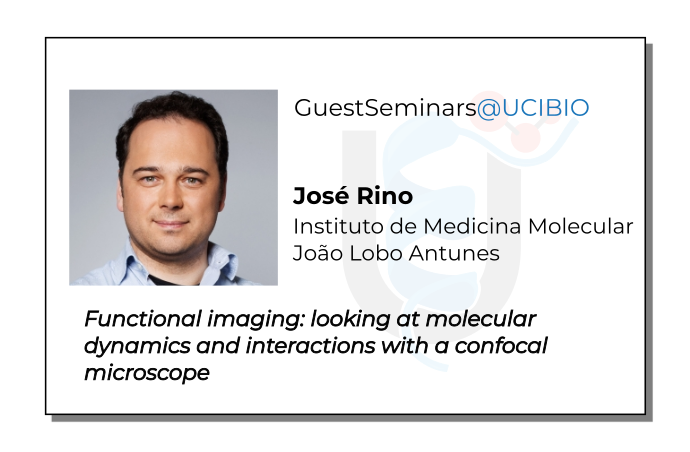
Functional imaging: looking at molecular dynamics and interactions with a confocal microscope
José Rino, Instituto de Medicina Molecular João Lobo Antunes, Portugal
Host: Ana Rita Grosso, UCIBIO NOVA
ZOOM link: https://ucibio.pt/l/GuestSeminars
ID da reunião: 865 7786 0516
Senha: 805165
Shot Bio:
José Rino graduated in Technological Physics Engineering from Instituto Superior Técnico, Technical University of Lisbon in 1999 and joined the lab of Prof. Maria Carmo-Fonseca at the Faculty of Medicine, University of Lisbon in the same year for his PhD, which was focused on the study of dynamics and interactions of nuclear proteins with quantitative photobleaching microscopy. During this period, José Rino collaborated and trained in advanced microscopy techniques at the labs of Dr. Elisa Izaurralde and Dr. Jan Ellenberg at the European Molecular Biology Laboratory and of Prof. Theodorus Gadella at the University of Amsterdam. José Rino postdoctoral research, carried out at the Instituto de Medicina Molecular (IMM) in the lab of Prof. Carmo-Fonseca, focused on applying quantitative microscopy methods to study mRNA biogenesis. In 2009, José Rino was hired under the Ciência 2008 program by the IMM as Head of the Bioimaging Unit, the core microscope facility of the Institute. Between 2013 and 2016 José Rino was also responsible for the Optical Imaging and Microscopy Platform of the Champalimaud Centre for the Unknown, Lisbon. In 2016 he was also appointed by the IMM as Head of the Flow Cytometry Unit, being responsible for both the Bioimaging and Flow Cytometry Units until January 2020. José Rino is currently Head of the Bioimaging Unit at the Instituto de Medicina Molecular João Lobo Antunes. His scientific research is currently focused on combining advanced quantitative microscopy methods with the development of bioimage analysis tools to study biological processes inside living cells with single molecule resolution.
